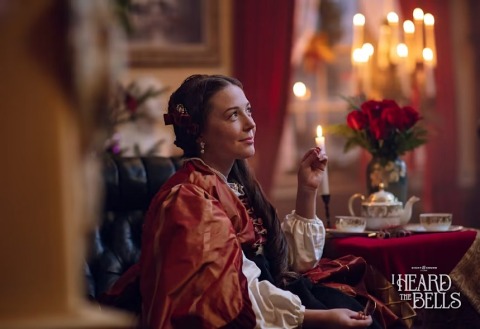Christmas music has a way of touching places in our hearts nothing else can reach. In fact, it’s the universal language of this special season. It stirs our memories and binds together generations of families.
Behind every song is a story, and this year, there’s a brand-new family film telling how the beloved carol “I Heard the Bells on Christmas Day” came to be. You may already know it was written by the famed poet, Henry Wadsworth Longfellow. But what most people don’t know is the rest of the story behind this particular piece of Christmas tradition.
Composed on the heels of tragedy, it’s a carol that attempts to capture the dissonance Longfellow was feeling during the Christmas of 1863. Widowed and the father of a wounded Union soldier, it’s both hopeful and haunting.
Thanks to the talented crew at “Sight and Sound” – a legendary entertainment company based in Lancaster, Penn., known for staging epic theater productions based on the Bible – the stirring and dramatic story is now on the big screen. It’s the first film they’ve ever done – and given the finished product, it surely won’t be their last.
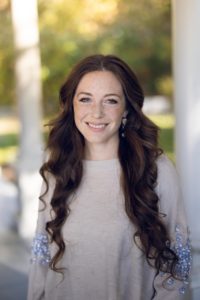
I had the privilege of speaking with Rachel Day Hughes, one of the leading actors in “I Heard the Bells.” A 2013 graduate of Liberty University, Rachel played the role of Fanny Longfellow, the beloved wife of Henry:
Paul: Can you tell us about your childhood and family?
Rachel: I was very blessed to grow up in a wonderful Christian home. My dad is a worship pastor and served at First Baptist Dallas. That’s the first church I remember. Then we moved on to serve in churches in Branson, Missouri, and then Richmond, Virginia. That’s where my family is now, where my dad is serving at North Run Baptist Church. God was so faithful to me throughout my childhood. I’m the oldest of three kids. My brother is three years younger than me, and he’s now an Air Force pilot. My sister is six years younger than me, and she’s a music teacher.
The Lord brought me to Liberty University, which is where I studied acting and received my degree and then went on to performance at Sight and Sound for a number of years.
Paul: How much of a role did music and acting play in your family? A lot of singing and instruments?
Rachel: Oh, I wish there were more instruments! There was a lot of music, a lot of theater, a lot of worship. My dad produces and directs theater for churches and that was part of what he did for First Baptist Dallas and everywhere else he’s been. I grew up on the stage. I think I was three when I was in my first show. It was just a part of my blood. It’s just a part of our family culture with theater all the time, and specifically theater in a Christian context.
I have to give credit to this incredible organization called Character Works, which is based in Richmond Virginia. It’s a faith-based theater program for students, kindergarten through 12. I spent a lot of my formative years performing there. I really fell in love with the art of storytelling, but also just the culture of theater people who love Jesus. It’s definitely a niche. But it was my niche, it was my people.
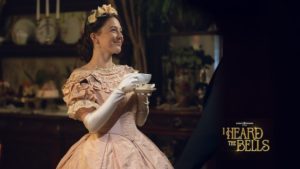
Paul: Your parents moved to Richmond, I presume, to follow a call concerning your dad’s music as music minister. It just so happened the Character Works group was there? That wasn’t planned?
Rachel: No, not at all. Yes, that’s exactly right. He was just following a call to a different church. I believe it was the Lord who brought us to that parachurch organization, Character Works. It became formative for me.
Paul: Since you’ve performed at such a young age, do you remember feeling nervous about it or was it just so natural it didn’t really bother you?
Rachel: There’s always an element of nerves for sure. That’s not a bad thing. I was always a very imaginative, creative, expressive kid. You can imagine like a little Anne of Green Gable’s kind of girl. I remember being told by people outside my family and groups that I was overly dramatic, or too much, or whatever. But within my family and inside the Character Works organization, I was encouraged to tell stories and to use that big imagination productively – and to do that in theater. I felt like doing shows, singing and acting, and being on stage was really the place where those parts of who I am made the most sense. So, in terms of nerves, I think there’s always a little bit of that, but I never really had stage fright.
Paul: How did you manage ego and all the attention you were receiving at such a young age? Did you ever have to struggle with that at all?
Rachel: Pride is such an interesting sin issue. It’s so pervasive. I’m a parent now too, so I’m trying to parent through that issue. I think as my faith matured, as the Lord grew me as a Christian, I realized how everything that we do as creatives is God working through us or probably better yet – us reflecting Him. We image Him when we create, because He’s the ultimate Creator. So, when we create things, when we walk in our calling, and especially when we tell stories that glorify Him directly with content, we are just reflecting back His light.
It can sound somewhat cliche to say, “To God be the glory.” But that really is true. And it’s not just me up there on stage or on screen. It’s the Lord working through me. I could tell hundreds of stories of miracles and little mini miracles or seemingly coincidental incidents about how God brought me to where I am today. I could tell you so many stories how He was faithful to allow me to do all of these things. None of it is in my own strength.
Even though nerves might not have been a huge part of my story, insecurities in other ways – and feelings of inadequacies, or feeling like something was impossible for me at a given time – is certainly something I struggle with.
Paul: How different was it for you to go from Sight and Sound stage performances to film? It seems like it’s a big dramatic shift.
Rachel: It was a dramatic shift. I was very, very nervous. It was new for me. I was afraid that I would come across too big, that I wouldn’t be able to play subtleties because I’m so used to being on the stage and communicating across like a football field distance. In the lens of film, it’s right next to your eyeball. It’s so different. The whole context of the theater is so different, because you’re there in the scene and everybody is on stage with you. You see the entire set, the whole context of the show from start to finish.
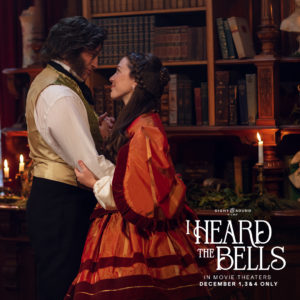
But with film, you’re such a teeny tiny piece of a puzzle, and it often gets changed after you’re done. You show up, and you do your one little part. You might not even be on the set. You might not have another actor with you at all. And then after you wrap your scene, the editors and the directors might completely change what comes before or after your moment. And so, you have to be able to trust your director, because you as an actor have much less information to base your judgment calls off of.
And so thankfully Josh Enck is a fantastic director, and I’ve worked with him before on the stage and a little bit with some film shoot, and he had such a clear vision for what he wanted. And so he was able to really help. On the flip side, what was actually surprisingly similar about theater to film is I found that truth is truth. You know, when you’re acting on stage, you want to make choices that are honest and genuine and authentic.
When you’re acting on film, you also want to make choices that are honest, genuine authentic. It’s just the scope of those choices. So on stage I might make the same choice, but use my entire body and a huge voice to communicate the moment of the story. But on film, I would make the same choice only using my eyes, and so it was really just how to make honest moments believable, how to really embody the character truthfully, but scaling all of those choices back.
Paul: One of the more powerful and poignant parts of “I Heard the Bells” are the opening scenes. It’s such a happy portion of the film depicting the love, joy, fun – and fleeting fragility of family life. Can you talk about that experience?
SPOILER ALERT
Rachel: We actually filmed everything in reverse order, believe it or not. And that’s because I was expecting my second child right when they began filming. They had to film the second half without me. My daughter was two-months old when I got to set and we started filming with me. The whole thing was backwards, including my portion. So the very first thing I ever filmed was laying in the coffin.
(Note: In 1861, Fanny Longfellow tragically died in a house fire. Her husband, Henry, was seriously injured attempting to save her.)
Paul: How difficult was it to film the fire scene?
Rachel: I felt very well taken care of. They had rigged a second identical gown. It was fireproofed and had some fog underneath it. There were people with fire extinguishers right next to me, right off screen, ready to go. There was some live fire in the room, but it never actually touched the gown at all. Anything that you see on the gown is CGI (Computer Generated Imagery) is not real. The live fire in the room were flame bars that were used to put flames on screen in the foreground and to also cast real firelight in the room to make it look believable.
Paul: So, after all of that, the happy opening scenes must have been a relief?
Rachel: Those scenes were the last thing we filmed. By the time we got there, we were really close. It was a blast. It was so dreamy, so much fun, so warm and then it was over. We had the “summer camp blues.” And then, of course, filming backwards like that you get to the beginning, which is the end of your experience, and you wish you could go back and make different choices, but that’s just not possible.
Paul: Is it disappointing for an actor to have their character die, to only be in half the movie?
Rachel: I was so curious as to what was going on when I wasn’t there, but Fanny’s voice is still in towards the end, singing “I heard the Bells.”
Paul: Your music video was beautiful. That must have been special to film.
Rachel: Yes, that was definitely a dream. You know, as a little girl, I always dreamed about doing a music video or something, and I just couldn’t believe it was actually happening.
Paul: As an actress, do some roles personally impact you more than others?
Rachel: That is a great question. Absolutely. I don’t know if I even have words to put to it. It has been so deeply fulfilling in so many specific ways, and this is where I see the fingerprint of the Lord on the whole thing.
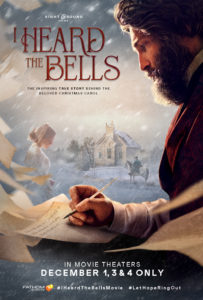
Fannie was a very well-documented historical figure that not many people remember. And so, as I started researching who she was, I found this book called, “Mrs Longfellow.” It’s all of her first handwritten letters, diary entries. She even kept a spiritual journal, that detailed her spiritual walk, her journey of faith. I felt like I really got to know this incredible woman through her own words. And so learning about her and getting to know her, I felt so connected to her because she was an artist, she was a woman with big emotion, big feelings, serious convictions, and big ambitions.
And then she became the wife of an artist, which I am as well. And that whole journey is beautiful in and of itself. She then became the mother of beloved children. And on the cusp of the Civil War she was raising boys. I felt like I could relate to so many of her struggles and her joys. And even a little bit of the fears, fears that come through in the movie. The fear of losing a child was so intense during that time. Watching her and reading her words that she wrote in the journal as she communed with the Lord was deeply encouraging to me because I saw myself in so much and in so many of the things that she said.
There were so many small details that meant so much to me. I Iove to do calligraphy. And so, they had me do all the calligraphy for all the props. I got to sing, which is just so special to me. And I got to dance. I got to be a mother, which is so near and dear to my heart. From top to bottom, the whole thing was wildly fulfilling. And I could not be more grateful for the experience,
Paul: Does your real-life husband, Caleb, in any way parallel Henry Wadsworth Longfellow?
Rachel: Absolutely. Yes. Caleb is the artistic director of a nonprofit theater ministry called Piercing Word. I’m involved in it, too. What we do there is we take the Word of God straight from the ESV Bible. We adapt it into dramatic and musical presentations, and we tour nationally. And that is what he does full time.
Caleb is someone who mirrors Henry in that he’s wildly creative, and very, very passionate about his work. He feels very called to it and allows me to speak into it from time to time, which is something you also see in the film with Fannie. Henry honors and respects her opinion. She encourages him and challenges him to write those poems. In the film and in real life, she really called him up in some ways. While I don’t claim to do that, there is definitely a big parallel there.
Paul: There is a recurring word of admonishment in the film from Fanny: “Henry, lift up your eyes!” Was Henry very introverted?
Rachel: That’s such a beautiful theme. Yes, as an historical figure, he was very introverted and actually struggled with depression a little bit. He was melancholy. If you read their story, you realize she was the light of his life. She was probably stronger in her faith than he was, and her faith bolstered his faith and reignited his hope in the Lord.
Paul: You’re a wife and a mother to a boy and a girl. How do you manage and navigate all of it?
Rachel: [Laughing] I’ll let you know when I figure it out. Yes, I have a five-year-old and a one-year-old and so juggling all of it is a daily surrender to the Lord. Even just this morning. I’ve never really found the idea of balance to be completely possible. Balance implies that you can fall off of the balance beam really easily. A huge part of my spiritual journey is balancing.
My first calling is just to be a Christian, just to be a follower of Jesus. And then it’s to be married and be a faithful wife to my husband. And then it’s to be a mother, to shepherd the children’s hearts. Another calling is vocational, whether ministerial or artistic. How those intersect every day is certainly a challenge. But God has been so faithful to allow me to pursue and to walk in these other callings, bringing my family along with me for the ride.
As I mentioned, I started this film 11 weeks after the birth of my daughter. I was facing the shooting in a bit of a panic. I didn’t know how I was going to do it. My daughter is so dependent on me. I was really stressed about it. And so, I was praying and praying, and the Lord put it on my heart to just ask for what I needed. “You have not because you ask not.” The production crew was so gracious, and we filmed most of my scenes at Moonstone Manor, which is that big, beautiful house in the film. It’s a bed and breakfast. It’s a huge mansion. They said, “You can have the whole third floor. And so, my whole family moved into the mansion for a week and a half. The baby was upstairs the entire time and so they made a huge accommodation for me to be able to be both a mother on screen and off. I am so grateful to the crew, and to the Lord.
Paul: Isn’t that great when the Lord works things out for us? So what’s next for you? I mean having this taste of film, and obviously steeped in theater background – do you foresee or envision yourself doing more of both or more of one or the other?
Rachel: That’s a great question. I think theater will always be in my blood. I have a couple of projects coming up there. But I really fell in love with film, and I hope to do more in the future.
Paul: How can people keep up with you?
Rachel: People can find me on Instagram at Rachel.Day.Hughes.
Paul: Thanks again for visiting with us.
Rachel: It’s been my pleasure. Merry Christmas!
LINKS: I HEARD THE BELLS MOVIE (To find a theater)

